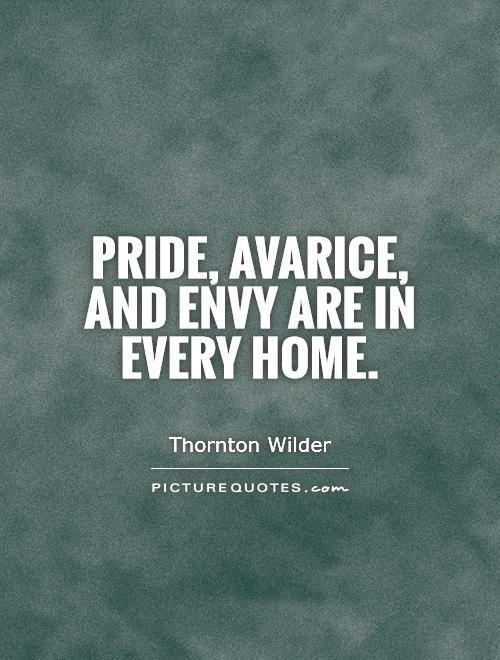Pride, avarice, and envy are in every home

Pride, avarice, and envy are in every home
Thornton Wilder, a renowned American playwright and novelist, is known for his exploration of the complexities of human nature and relationships in his works. In his play "The Skin of Our Teeth" and novel "The Bridge of San Luis Rey," Wilder delves into the themes of pride, avarice, and envy, showcasing how these vices are prevalent in every home and can have profound effects on individuals and society as a whole.Pride, avarice, and envy are universal human traits that can be found in every household, regardless of social status or background. In "The Skin of Our Teeth," Wilder presents a satirical depiction of the Antrobus family, who embody these vices in various ways. Mr. Antrobus, the patriarch of the family, is portrayed as a proud and ambitious man who is constantly striving for success and recognition. His wife, Mrs. Antrobus, is envious of her neighbor and harbors resentment towards her for her perceived superiority. Their son, Henry, is consumed by avarice and is willing to do whatever it takes to achieve his goals, even if it means betraying his own family.
Similarly, in "The Bridge of San Luis Rey," Wilder explores how pride, avarice, and envy can lead to tragic consequences. The novel follows the lives of five individuals who perish in a bridge collapse in Peru, and examines the interconnectedness of their lives and the role that these vices play in their fates. Dona Maria, a proud and wealthy woman, is consumed by envy towards her daughter, who she believes has surpassed her in beauty and charm. Brother Juniper, a Franciscan monk, is driven by avarice in his quest to uncover the reasons behind the tragedy, leading to his own downfall.
Through his works, Wilder highlights how pride, avarice, and envy can corrupt individuals and tear families apart. These vices are not limited to any particular social class or time period, but are inherent in human nature and can have devastating consequences if left unchecked. By shining a light on these universal themes, Wilder challenges his audience to reflect on their own actions and relationships, and consider the impact that these vices can have on their lives and the world around them.












 Friendship Quotes
Friendship Quotes Love Quotes
Love Quotes Life Quotes
Life Quotes Funny Quotes
Funny Quotes Motivational Quotes
Motivational Quotes Inspirational Quotes
Inspirational Quotes